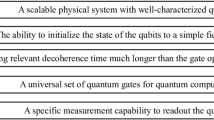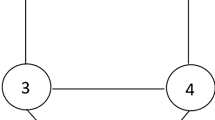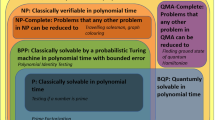Abstract
One of the difficult tasks in quantum computation is inventing efficient exact quantum algorithms, which are the quantum algorithms that output the correct answer with certainty on any input. We improve and generalize the semidefinite programming (SDP) method of Montanaro et al. (Algorithmica 71:775–796, 2015) in order to evaluate exact quantum query complexities of partial functions. We present a more systematical approach to achieve the “inspired” result by Montanaro et al. for the function \(\text {EXACT}_{2}^{4}\), which is the Boolean function of 4 bits that output only when 2 of the input bits are equal to 1. The same approach also allows us to reduce the size of the ancilla space used by the algorithms that evaluate symmetric functions like \(\text {EXACT}_{3}^{6}\). We employ the generalized SDP to verify the complexities of the earliest and best known quantum algorithms in the literature, namely, Deutsch–Jozsa and Grover algorithms for a small number of input bits. We utilized the method to solve the weight decision problem of bit strings with lengths up to 10 bits and observed that the generalized SDP gives better exact quantum query complexities than the known methods. Finally, we test the method on some selected functions and demonstrate that they all exhibit quantum speedup.

Similar content being viewed by others
References
Buhrman, H., De Wolf, R.: Complexity measures and decision tree complexity: a survey. Theor. Comput. Sci. 288(1), 21–43 (2002)
Deutsch, D., Jozsa, R.: Rapid solution of problems by quantum computation. Proc. R. Soc. Ser. A 439(1907), 553–558 (1992)
Grover, L.K.: Quantum mechanics helps in searching for a needle in a haystack. Phys. Rev. Lett. 79, 325 (1997)
Ambainis, A.: Quantum walk algorithm for element distinctness. SIAM J. Comput. 37(1), 210–239 (2007)
Bennett, C.H., Bernstein, E., Brassard, G., Vazirani, U.: Strengths and weaknesses of quantum computing. SIAM J. Comput. 26(5), 1510–1523 (1997)
Simon, D.R.: On the power of quantum computation. SIAM J. Comput. 26(5), 1474–1483 (1997)
Shor, P.W.: Polynomial-time algorithms for prime factorization and discrete logarithms on a quantum computer. SIAM J. Comput. 26(5), 1484–1509 (1997)
Farhi, E., Goldstone, J., Gutmann, S., Sipser, M.: A limit on the speed of quantum computation in determining parity. Phys. Rev. Lett. 81, 5442–5444 (1998)
Ambainis, A.: Superlinear advantage for exact quantum algorithms. SIAM J. Comput. 45(2), 617–631 (2016)
Ambainis, A., Balodis, K., Belovs, A., Lee, T., Santha, M., Smotrovs, J.: Separations in query complexity based on pointer functions. J. ACM 64(5), 1–24 (2017)
Beals, R., Buhrman, H., Cleve, R., Mosca, M., de Wolf, R.: Quantum lower bounds by polynomials. J. ACM 48, 778–797 (2001)
Ambainis, A.: Quantum lower bounds by quantum arguments. J. Comput. Syst. Sci. 64, 750–767 (2002)
Vazirani, U.: On the power of quantum computation. Philos. Trans. R. Soc. London Ser. A: Math. Phys. Sci. 356 356, 1759–1768 (1998)
Høyer, P., Spalek, R.: Lower bounds on quantum query complexity. Bull. EATCS 87, 78–103 (2005)
Barnum, H., Saks, M., Szegedy, M.: Quantum query complexity and semi-definite programming. In: Proceedings of 18th Annual IEEE Conference on Computational Complexity, pp. 179–193. (2003)
Spalek, R., Szegedy, M.: All quantum adversary methods are equivalent. Theory Comput. 2(1), 1–18 (2006)
Montanaro, A., Jozsa, R., Mitchison, G.: On exact quantum query complexity. Algorithmica 71, 775–796 (2015). arXiv:quant-ph/1111.0475v2
Gruska, J., Qiu, D., Zheng, S.: Generalizations of the distributed Deutsch–Jozsa promise problem. Math. Struct. Comput. Sci. 27(3), 311–331 (2017)
Zheng, S., Qiu, D.: From Quantum Query Complexity to State Complexity, Gruska Festschrift. Lecture Notes in Computer Science, vol. 8808, pp. 231–245. Springer, Cham (2014)
Even, S., Selman, A.L., Yacobi, Y.: The complexity of promise problems with applications to public-key cryptography. Inf. Control 61, 159–173 (1984)
Canteaut, A., Videau, M.: Symmetric boolean functions. IEEE Trans. Inf. Theory 51(8), 2791–2811 (2005)
Goldreich, O.: On promise problems: a survey. Essays Mem. Shimon Even, LNCS 3895, 254–290 (2006)
Ambainis, A., Spalek, R., de Wolf, R.: A new quantum lower boundmethod, with applications to direct product theorems and time-space tradeoffs. Algorithmica 55(3), 422–461 (2009)
Horn, R.A., Johnson, C.R.: Matrix Analysis, 2nd edn. Cambridge University Press, New York (2013)
Grant M., Boyd, S.: CVX: Matlab software for disciplined convex programming, version 2.0 beta. (2013). http://cvxr.com/cvx. Accessed Dec 2017
Grant M., Boyd, S.: Graph Implementations for Nonsmooth Convex Programs, Recent Advances in Learning and Control (a tribute to M. Vidyasagar), V. Blondel, S. Boyd, and H. Kimura, (eds.), 95–110, Lecture Notes in Control and Information Sciences, Springer, (2008) http://stanford.edu/~boyd/graph_dcp.html
Dattorro, J.: Convex Optimization and Euclidean Distance Geometry. \({{\cal{M}}}\epsilon \beta oo\), Palo Alto (2005)
Uyanık, K., Turgut, S.: A new sure-success generalization of Grover iteration and its application to weight decision problem of Boolean functions. Quantum Inf Process. 12(11), 3395–3409 (2013)
Brassard, G., Høyer, P., Mosca M., Tapp. A.: Quantum amplitude amplification and estimation. In: Lomonaco, S.J. Jr. (ed.) Quantum Computation and Quantum Information: A Millennium Volume, of AMS Contemporary Mathematics Series, vol. 305, pp. 53–74 (2002). arXiv:quant-ph/0005055
Høyer, P.: Arbitrary phases in quantum amplitude amplification. Phys. Rev. A 62, 052304 (2000)
Long, G.L.: Grover algorithm with zero theoretical failure rate. Phys. Rev. A 64, 022307 (2001)
Nielsen, M.A., Chuang, I.L.: Quantum Comput. Quantum Inf. Cambridge University Press, Cambridge (2000)
Brassard G., Høyer P., Tapp A.: Quantum counting. In: Proceedings of the 25th International Colloquium on Automata, Languages and Programming, Lecture Notes in Computer Science, vol. 1443, pp. 820–831 (1998)
Choi, B.S., Braunstein, S.L.: Quantum algorithm for the asymmetric weight decision problem and its generalization to multiple weights. Quantum Inf. Process. 10(2), 177–188 (2011)
Nisan, N., Wigderson, A.: On rank vs. communication complexity. Combinatorica 15(4), 557–565 (1995)
Ambainis, A.: Polynomial degree vs. quantum query complexity. J. Comput. Syst. Sci. 72(2), 220–238 (2006)
Høyer, P., Lee, T., Spalek, R.: Negative weights makeadversaries stronger. In: Proceedings of 39th ACM STOC, pp. 526–535(2007)
Laplante, S., Lee, T., Szegedy, M.: The quantum adversary method and classical formula size lower bounds. Comput. Complex. 15(2), 163–196 (2006)
Acknowledgements
This work has been supported by the Scientific and Technological Research Council of Turkey (TÜBİTAK) - 2218 Fellowship for Postdoctoral Researchers. We would like to thank Özgür Çakır for helpful discussions.
Author information
Authors and Affiliations
Corresponding author
Additional information
Publisher's Note
Springer Nature remains neutral with regard to jurisdictional claims in published maps and institutional affiliations.
Rights and permissions
About this article
Cite this article
Uyanık, K. Evaluation of exact quantum query complexities by semidefinite programming. Quantum Inf Process 18, 177 (2019). https://doi.org/10.1007/s11128-019-2297-3
Received:
Accepted:
Published:
DOI: https://doi.org/10.1007/s11128-019-2297-3




